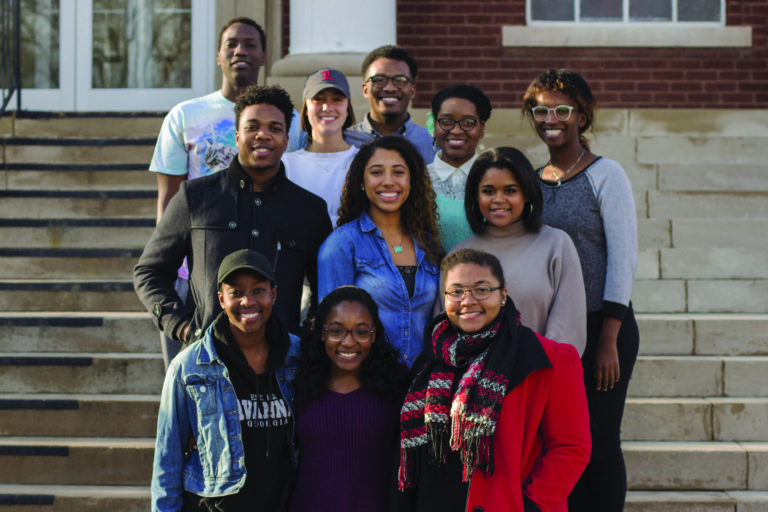by Sophie Saint-Firmin, News Editor
Entering college can be a very lonely and intimidating experience for any student, but particularly for minority students in a predominantly white college. It is easy to feel out of place, and having a strong support system is a crucial aspect that can determine how one assimilates to college culture.
“When I first got here [to Asbury], I didn’t know who to hang out with,” explained sophomore Benjamin Black. “Now I have some long lasting friendships.”
According to Asbury University’s Office of Intercultural Affairs, the percentage of minority students has increased from 7 percent to 18 percent since 2016, but there is still a high demand for a more culturally diverse and aware campus. International, third-culture and U.S. ethnic students rely on various minority clubs to foster support and community with others that share similar cultural backgrounds.
The Black Student Alliance (BSA) was the first ethnic group formed at Asbury. It began in 2009 when a group of African- American students expressed the need for a place to exist without having to explain themselves. “We all need places and spaces where we feel like we belong,” explained Esther Jadhav, associate dean for intercultural affairs.
According to several members, the BSA is not only a club where students can share and revel in African culture, but it is a group that prides itself in helping educate students about different minorities. BSA Publicist Breana Staten, a freshman, said that although the group is primarily black, they all come from different places. Members of the club have stated that the BSA has helped them shape their own cultural identity by learning and being surrounded by others that come from different cultures.
Although the group was initially focused on fellowship with people of the same ethnicity, its aim has shifted. “Our purpose is to bring diversity to people unfamiliar with black culture, and to find a way to show our culture,” said Black, who is now the president of the BSA.
“I believe that all of our student alliance groups on campus are very important because, in many ways, while they are not meant to be seen as exclusive, they do create a space for students to reflect and share their personal experiences with those of similar backgrounds who are able to better understand,” said Student Body President Tim Shell.
Contrary to popular belief, the BSA is not exclusively for black students. Whether it is due to a fascination with a culture, or to gain a better understanding of it, all students are invited to take part in these ethnic clubs, according to club members. Participation is encouraged because it paves the way to engage in open conversation. “Our student alliance groups serve as a way through which students are able to connect with others through their various backgrounds,” Shell added.
Freshman Brody McKinnon said that it is interesting being a part of the “minority” as a Caucasian member of the BSA. He recently joined the club
as a way of broadening his perspective on diversity and not looking at people through a “singular lens,” McKinnon said. “I don’t want to close somebody off because they are different than me. I want to be associated with them because they are different.”
Graduate student Ereika Smith participated in the BSA for all four years of her undergraduate studies at Asbury and continues to be an active member today. When asked why she was still a member of the group, she responded that society has not changed over the couple of months that she transitioned to graduate school. “The group comes together to learn about community, culture and to celebrate differences,” she said.
Membership is dependent upon current student enrollment and, despite fluctuating participation, the BSA is a “thriving and robust group,” according to Jadhav. Due to the popularity and demand for more cultural representation, organizations such as the Latina/o and Asian-American Associations have also emerged.
One method these groups use to promote their campaigns is to host campus-wide events centered around their respective cultures. The BSA hosts an array of events. Among these is Black History Week, where all students are invited to participate in poetry readings and musical events. as well as movie and game nights.
Jadhav states that the BSA and other ethnic groups have done a great job at bringing cultural awareness to campus with its efforts.
These ethnic groups not only educate those outside of their club, but also educate themselves by interacting with other people. Malcolm X once said, “Ignorance of each other is what has made unity impossible in the past.” Diversity clubs are a mutually beneficial system, giving insight and educating individuals on each other’s cultures and world perspectives.
BSA Vice President Demarion Johnson, a freshman, said that his involvement with the BSA has given him the ability of “double vision,” where he sees the other person’s perspective and not just his own.
Students claim that the goals for these minority groups are to abolish any misconceptions about culture and to have a more integrated and educated campus. In a perfect world where culture and diversity are not just fully accepted, but celebrated, would there still be a need for the BSA? “Even if we eradicate misconceptions, we do share a common culture that needs to be celebrated,” said Staten. She later said that there will always be a need for groups that bring individuals together to celebrate and support each other.
Photo by Brody McKinnon




